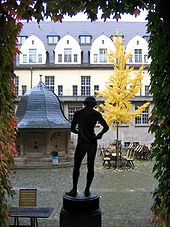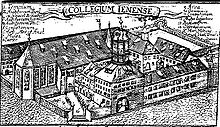Organisation

University of Jena. Inner courtyard with cafeteria of the Old University Building.
The university is organised into the following ten faculties:
- theology
- jurisprudence
- economics and business administration
- philosophy
- social and behavioural sciences
- mathematics and computer science
- physics and astronomy
- chemical and earth sciences
- biology and pharmacy
- medicine
历史

University of Jena around 1600. Jena was the center of Gnesio-Lutheran activity during the controversies leading up to the Formula of Concord.
The elector John Frederick, Elector of Saxony first thought of a plan to establish a university at Jena in 1547 while he was being held captive by emperor Charles V. The plan was put into motion by his three sons and, after having obtained a charter from the emperor Ferdinand I, the university was established on February 2, 1558.
Prior to the 20th century, University enrollment peaked in the 18th century. The university's reputation peaked under the auspices of duke Charles Augustus, Goethe's patron (1787–1806), when Gottlieb Fichte, G. W. F. Hegel, Friedrich Schelling, Friedrich von Schlegel and Friedrich Schiller were on its teaching staff.
Founded as a home for the new religious opinions of the sixteenth century, it has since been one of the most politically radical universities in Germany. Jena was noted among other German universities at the time for allowing students to duel and to have a passion for Freiheit, which were popularly regarded as the necessary characteristics of German student life. The University of Jena has preserved a historical detention room or Karzer with famous caricatures by Swiss painter Martin Disteli.
At the end of the 18th and the beginning of the 19th centuries, the German government militated against the university, which remained unpopular until recent times. This is believed to have been caused by the opening of new universities and the suspicions of the various German governments in regard to the democratic ideas coming out of Jena.
In the latter 19th century, the department of zoology taught evolutionary theory, with Carl Gegenbaur, Ernst Haeckel, and others, publishing detailed theories at the time of Darwin's "Origin of Species" (1858). The later fame of Ernst Haeckel eclipsed Darwin in some European countries, as the term "Haeckelism" was more common than Darwinism.
In 1905, Jena had 1100 students enrolled, and its teaching staff (including privatdozenten) numbered 112. Amongst its numerous auxiliaries then were the library, with 200,000 volumes; the observatory; the meteorological institute; the botanical garden; the seminaries of theology, philology, and education; and the well-equipped clinical, anatomical, and physical institutes.
During the 20th century, the cooperation between Zeiss corporation, and the university brought new prosperity and attention to Jena, resulting in a dramatic increase in funding and enrollment.
Research
Research at Friedrich Schiller University traditionally focusses on both humanities and sciences. In addition to the faculties the following "Collaborative Research Centres" (German "Sonderforschungsbereich", short: "SFB") operate at the university:
- SFB 630 „Erkennung, Gewinnung und funktionale Analyse von Wirkstoffen gegen Infektionskrankheiten“
- SFB/TR 18 „Relativistische Laser-Plasma-Dynamik“
- SFB 604 „Multifunktionelle Signalproteine“
- SFB 580 „Gesellschaftliche Entwicklung nach dem Systemumbruch. Diskontinuität, Tradition und Strukturenbildung“
- SFB 482 „Ereignis Weimar-Jena. Kultur um 1800“
- SFB 436 „Metallvermittelte Reaktionen nach dem Vorbild der Natur“
In 2006 the research center „Jena Center - History of the 20th century“ was founded. In 2007 the graduate school 214 „Jena School for Microbial Communication“ was established within the German Universities Excellence Initiative. In 2008 the "Center for Molecular Biomedicine" (CMB) and the interdisciplinary research center "Laboratory of the Enlightenment" were developed as the university's youngest research institutions.
Friedrich Schiller University is the only German University with a chair for gravitational theory.
Notable alumni
- Eva Ahnert-Rohlfs (doctorate astronomy 1951)
- Johann Bachstrom, writer, scientist, physician and Lutheran theologian
- Ernst Gottfried Baldinger, distinguished German physician
- Gottfried Benn
- Hans Berger
- Alfred Brehm
- Rudolf Carnap
- Nathan Cobb
- Georg Friedrich Creuzer
- Gottlob Frege
- Roland Freisler
- Johann Matthias Gesner
- Nelson Glueck
- Peter Griess
- Friedrich von Hagedorn
- Arvid Harnack
- Gerhart Hauptmann
- Cuno Hoffmeister
- Ján Kollár
- Karl Christian Friedrich Krause
- Gottfried Leibniz
- August Leskien
- Robert Ley
- Karl Marx (doctorate "in absentia", 1841)
- Rowena Morse Mann - first woman doctor of philosophy
- Ernest Nash
- Axel Oxenstierna
- Samuel von Pufendorf
- Arthur Schopenhauer (doctorate "in absentia", 1813)
- Hugo Schuchardt - linguist
- Johann Gustav Stickel - orientalist
- Michael Stifel
- Kurt Tucholsky
- Christa Wolf
- Christian Wolff
- Solomon Marcus Schiller-Szinessy - doctorate (philosophy) (mathematics)
Museums and collections at the University
- Academic Coin Cabinet
- Alphons Stübel Collection of Early Middle Eastern Photographs (1850 - 1890)
- Botanischer Garten Jena, the second oldest botanical garden in Germany
- Hilprecht-Collection of Ancient Oriental Art
- Mineralogical Collection
- Oriental Coin Cabinet
- Phyletical Museum
- Anatomic Collection
参考文献
- This article incorporates text from the Encyclopædia Britannica, Eleventh Edition, a publication now in the public domain.
Literature
- Mayhew, Henry (1864): German Life and Manners as Seen in Saxony at the Present Day: With an Account of Village Life - Town Life - Fashionable Life - Domestic Life - Married Life - School and University Life, &c., of Germany at the Present Time: Illustrated with Songs and Pictures of the Student Customs at the University of Jena. In Two Volumes. London [Vol. II, Section VII, Chapter VI-XI: Student Life at Jena].
External links
- University of Jena
- University of Jena, statistics
- Coimbra Group (a network of leading European universities)



